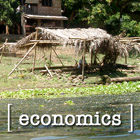
|
15 October 2007 Can the world prepare to face the potential economic fallout from increasingly intense weather phenomena, prolonged heat waves, desertification, ice-melt and flooding? While there is no clear proof Hurricane Katrina was a direct result of climate change, hurricanes of such intensity will become increasingly frequent as Gulf waters warm; the aftermath provides real instruction for just how fragile the social fabric can be in the face of natural disaster. A major US city and one of the world's major ports famously collapsed in the face of overwhelming inundation; society unraveled and the horrors were widely reported, with the military deployed to "pacify" the afflicted population. One of the great lessons is that that aftermath was likely wholly preventable, had warnings been heeded and the proper measures put in place. One of the most common arguments against comprehensive action to halt or slow climate change or to reduce carbon emissions or penalize polluters is that it would "hurt the economy". This is, first of all, shamefully unimaginative, and second, entirely untrue. There is no reason that the enormous amount of spending involved in overhauling global industry and transportation should in any way represent an obstacle to economic growth. Quite the contrary, it may be the biggest boom on record, if spending on innovation, sustainability and development, are properly encouraged. Governments have a role to play, but private business will have to stoop dragging its feet. Until now, caution in committing to clean energy solutions has been short-sighted and ill-advised. From now on, it may be fundamentally dangerous: society as a whole needs the economic elasticity provided by sustainable fuel sources, and businesses need to adapt now to the coming climate crunch, which will highly regulate destructive activities, such as pollution. As E.O. Wilson writes in this month's 150th anniversary edition of The Atlantic, "we need a stronger ethic, one woven in more effective ways from science and poetry. The foundation of it will be the recognition that humanity was born within the biosphere and that we are a biological species in a biologcial world." Finding that sense of what our activities really are, as part of a whole, will allow us to imagine more precisely how we can work with natural systems, to our advantage, to create and elaborate an industrial economy that does not put undue taxes on fragile natural processes that sustain the biosphere. Within the present economic make-up of global society, we have not yet developed the tools we need to anticipate and respond to all the possible difficulties resulting from a destabilized climate, but the technologies are close at hand, and their optimum applications are increasingly apparent, as science comes to grips with the power of natural systems, offset in our thinking by the parallel problem of their fragility. Wind power, wave power, solar power, geothermal, methane, natural gas, farmed bio-fuels and other 'new' resources are coming online, beginning to hint at what differences they may make. But we need a new approach from government, to ensure that investment does not continue to flow irresponsibly to the most destructive practices, when —taking long-term pollution and fixation costs into account— they are in fact not more beneficial to economic health and wellbeing. This will be the challenge for the next decade: to spur the growth of new energy economies, based on clean, renewable resources, while de-incentivizing those fuel sources with high exploration, extraction, containment and clean-up costs. Tax policy, mandatory emissions caps, grants for scientific research, and pro-active lending for cutting-edge enterprises, all have a role to play. [s]
|
||||||||||||||||||||||
|
|||||||||||||||||||||||











